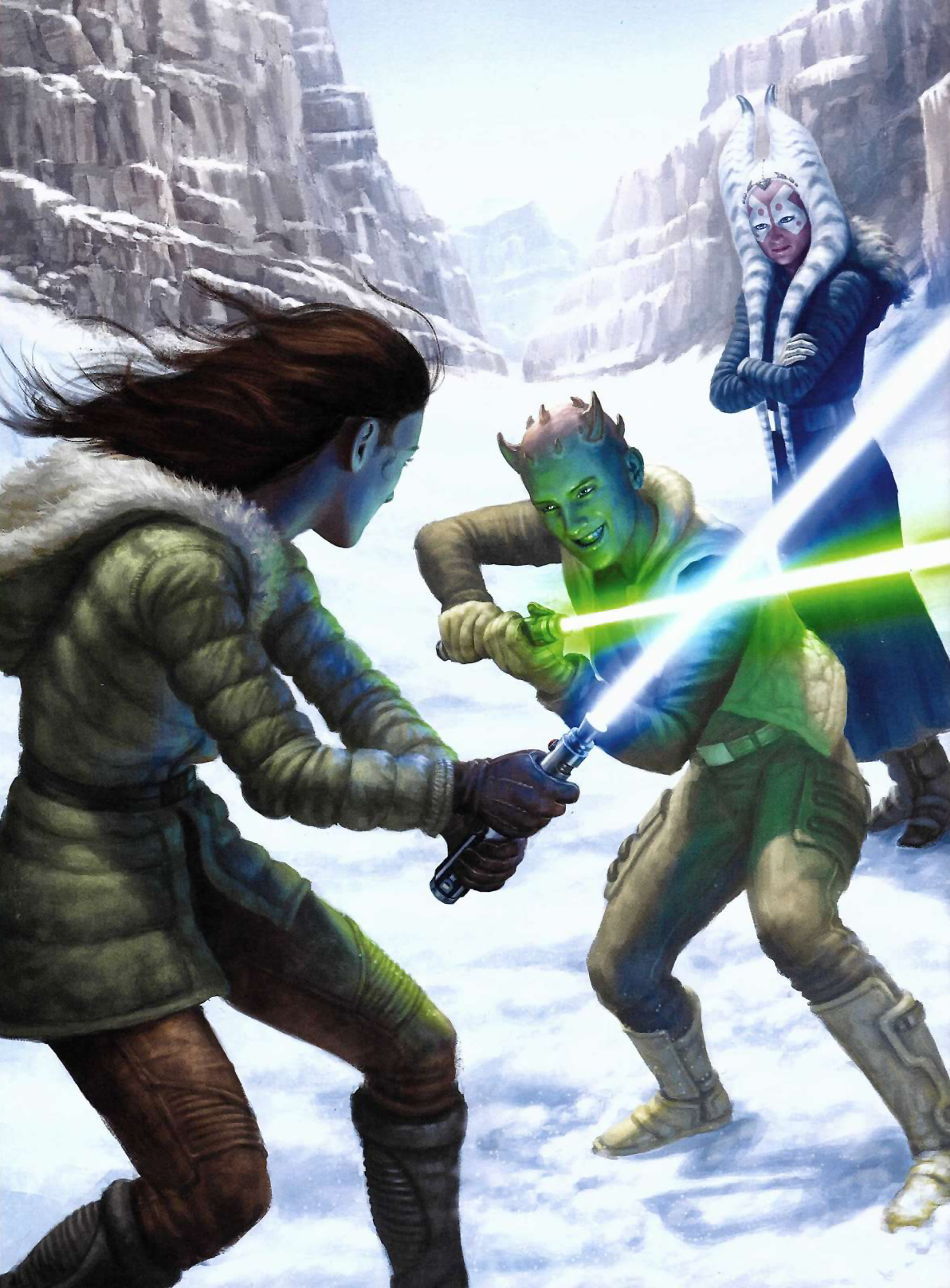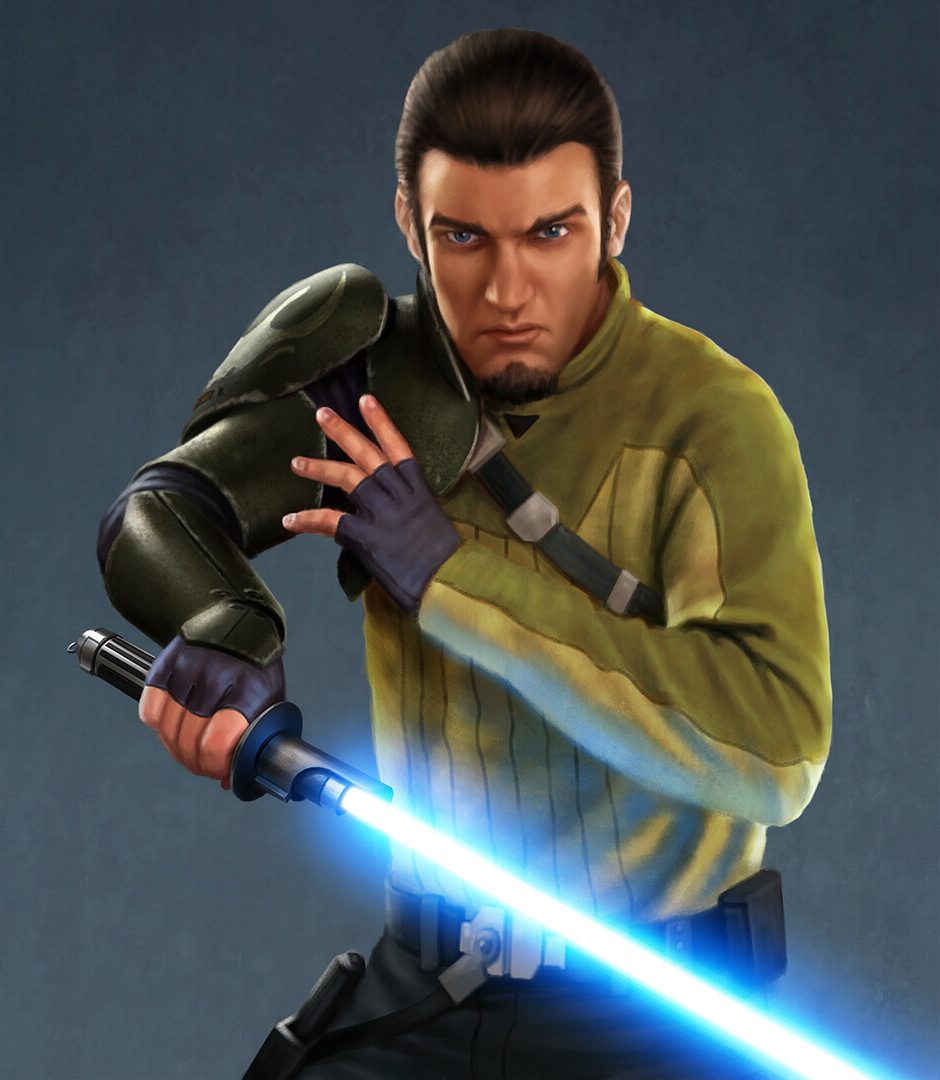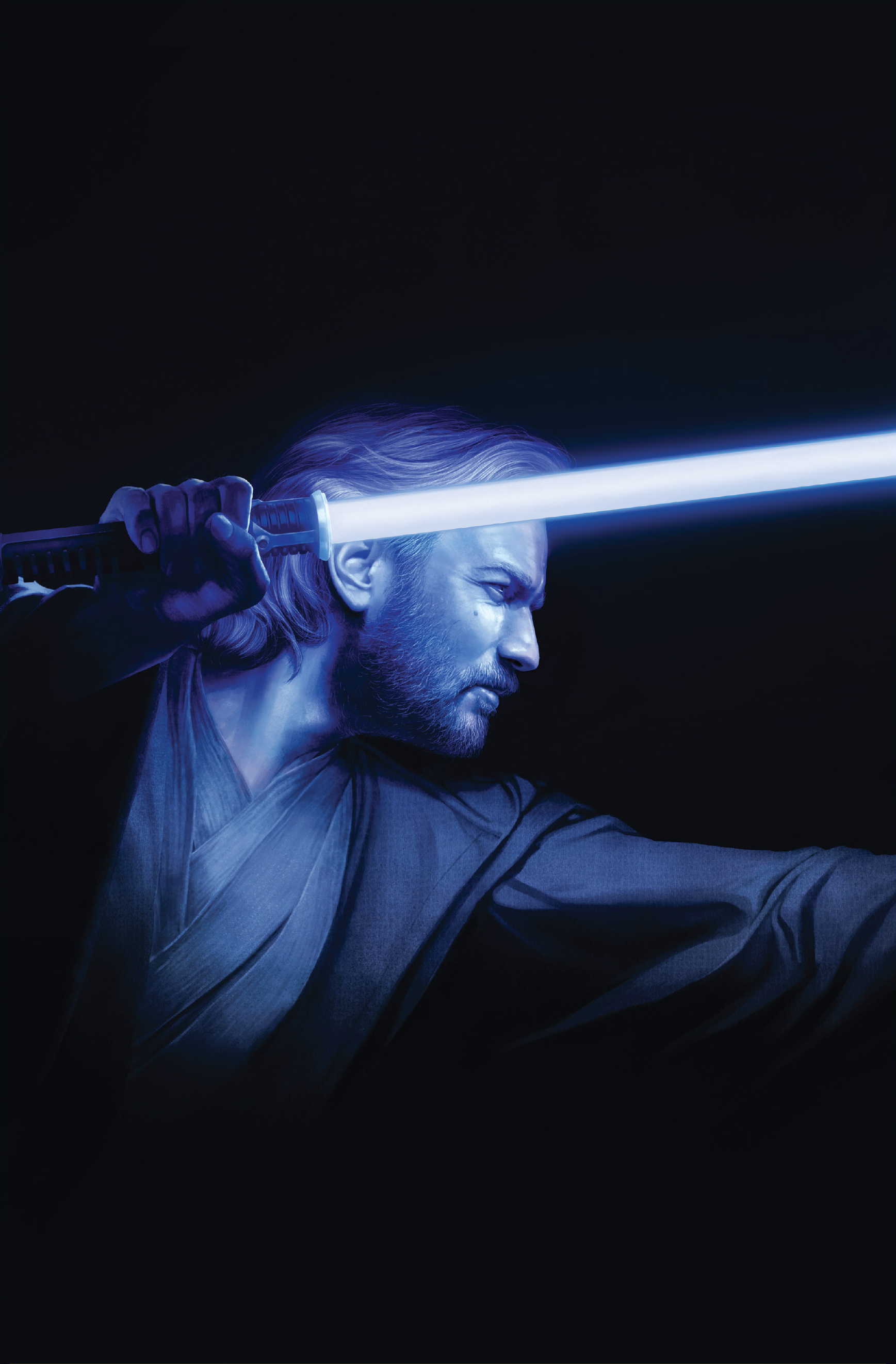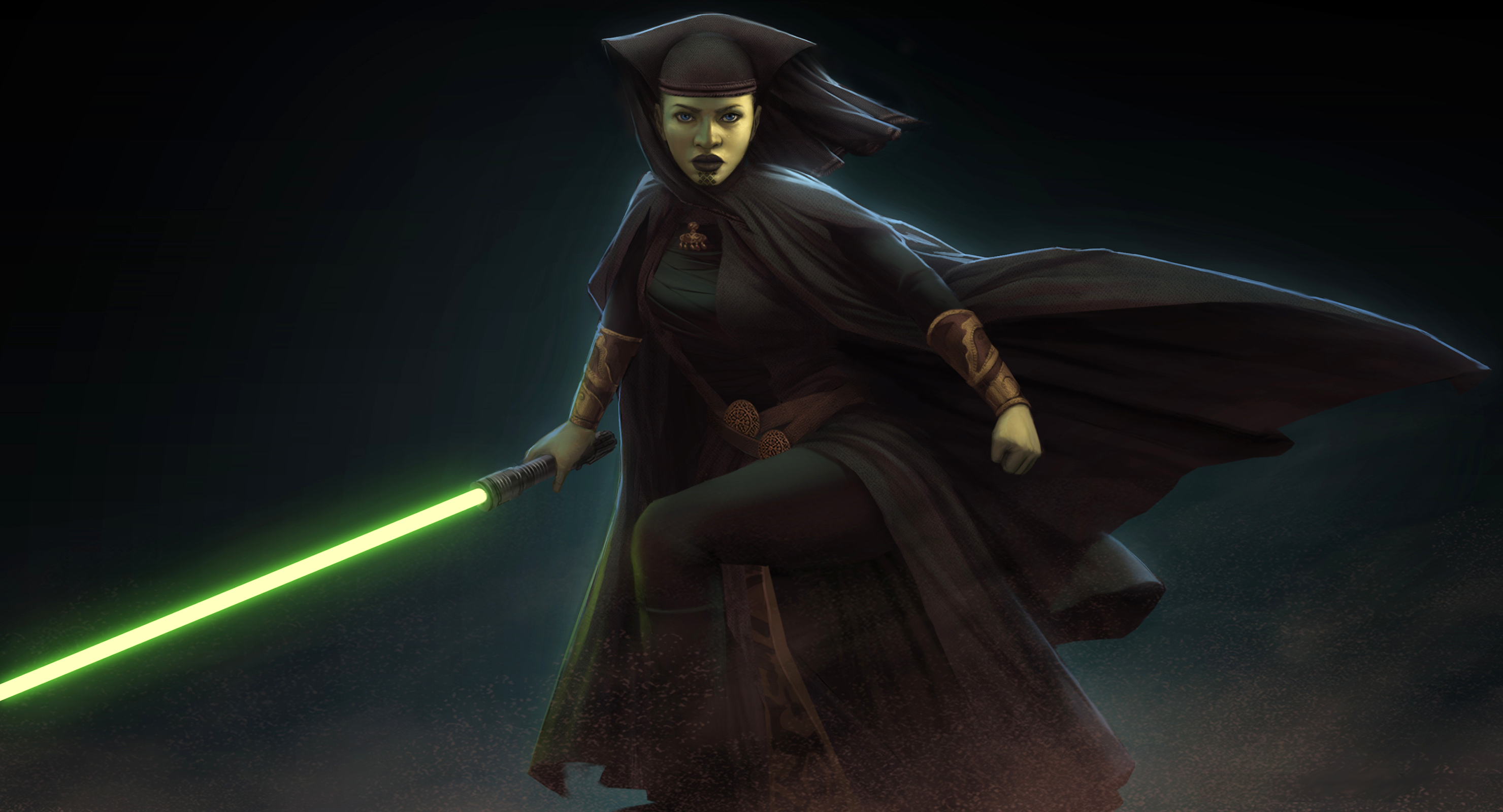Form III, also known as Soresu (pronounced sor-EE-soo), the Way of the Mynock, or The Resilience Form was the third form of lightsaber combat created by the Jedi Order. It focused more on defense than attack.
Proficient in its use, Jedi Master Depa Billaba taught her students, including Caleb Dume, to use Form III during close-quarter fighting. Jarrus later used Form III against the Grand Inquisitor, who recognized it as a staple of Billaba's instruction and was able to counter Jarrus' attempts to use it against him. Obi-Wan Kenobi also mastered the Soresu form of combat.

A Togruta master instructing students in Soresu.
Form III, or Soresu, developed in response to the growing prevalence of blasters throughout the galaxy. The necessity of an entirely new form to fill this niche stemmed from the relative ineffectiveness of Shii-Cho techniques in countering blaster fire, developed as they were from entirely melee-based techniques and from Makashi's complete lack of suitable techniques. Central to Soresu techniques was a lightsaber blade's ability to deflect blaster bolts and even, with extensive practice, to reflect them back at attackers. This latter possibility was one of the major breakthroughs in lightsaber combat in the era of blaster supremacy, and it was a key approach to damaging opponents while employing Form III. However, deflecting blaster bolts was only one tool in the defensive arsenal of a Soresu practitioner, who trained to block and parry lightsaber strikes, withstand numerous opponents, and above all maintain a calm focus that allowed an appropriate defensive response to any threat.
Ultimately, Form III was something that focused on defense from blaster bolts, lightsaber strikes, and other melee attacks. In every aspect of combat and in contrast to Form l's sweeping motions, Form III utilized tight, controlled movements and a strict economy of action. This was key to the total defense of Soresu, as even the slightest extraneous motion risked leaving an opening for a blaster bolt, vibroblade or lightsaber to slip through. This caution applied not only to Soresu fighters' lightsaber movements, but to their entire body. Form III stances presented a minimal target to assailants, which not only limited the opponent's avenues of attack, but reduced the area the Soresu practitioner had to defend with lightsaber parries and blocks.

Kanan Jarrus was proficient in Form III.
This strategy was representative of Soresu's thoughtful, even intellectual approach to all aspects of battle. Although proper employment of Soresu depended upon the practitioner's raw agility and speed, this was secondary to mental acuity. The form's emphasis on efficient and tightly controlled motions, somewhat relaxed the physical requirements. Further, the form emphasized not only moment-to-moment tactics but also a larger strategic approach to combat. Warriors using Form III took a broader view of battle, adapting as necessary to incoming attacks. The Soresu practitioner carefully considered each attack as well as the overall pattern, a purely defensive strategy that scaled with nearly any number of enemies.
Although it was initially developed primarily to address the issue of blaster fire, Form III took on greater significance as a form focused almost entirely on defending against attacks of any nature. Form I's emphasis on offense left the defensive uses of the lightsaber in need of further exploration, while Form II's protective techniques quickly lost effectiveness against numerically superior foes, especially if they were armed with blasters. Soresu may have originated to address the threat of blasters, but even once deflection techniques were incorporated into future forms, Form III remained a viable and worthy focus for Jedi thanks to its exhaustive focus on defensive techniques for all situations.

Obi-Wan Kenobi used Form III
Soresu's distinction as the Resilience Form was well earned, for its effective use depended on outlasting one's opponents. To properly employ the form, the practitioner had to focus entirely on defense, committing all mental resources to examine every move the enemy made. In this manner, the Soresu master prepared to take full advantage of the enemy's most exploitable opening, which most often came about as a result of physical exhaustion or mental frustration. Fortunately, the economical motions Form III employed helped to ensure practitioners didn't succumb to fatigue before their opponents.
Similarly, Soresu prized calm and tranquility in the practitioner, a control and minimization of mental and emotional variance as precise and complete as that of physical motion. While opponents grew increasingly frustrated with their inability to penetrate the Form III fighter's defenses, the Soresu practitioner calmly waited for a prime opportunity to strike. That this emphasis on the control of emotion so resembled the larger Jedi philosophy, likely spoke to Form III's endured popularity even after the advent of later forms.
During her duel against Count Dooku in The Works of Coruscant in 32 BBY, Jedi Master Yaddle adopted a Form III stance briefly when she stood her ground against the former Jedi.

Jedi Master Luminara Unduli was a Soresu master.
Most comfortable with Form III out of all the options available to her, Jedi Master Luminara Unduli was known for her use of the defensive form. In certain duels, however, Unduli was willing to take on a Makashi stance; while Form II left Unduli slightly more open to attack than Soresu would, its aggressive stance was an ideal form for battles against the Sith. Unduli passed on many Soresu techniques to her Padawan, Barriss Offee. Naturally, as a Padawan, she was not as skilled in lightsaber attack nor defense as her master. All the same, Offee's lightsaber style was slippery and saw her focus on respositioning herself. Ultimately, Offee's version of Form III was not the exact same as her more experienced mentor's usage. As the Clone Wars ground on, however, Offee found herself falling into the dark side of the Force and became more aggressive, even stealing the red lightsabers of former Sith assassin Asajj Ventress because she believed they suited her new self.
Form III appeared in the 2002 film . It was first identified as such in a Acme Archives Direct Character Key titled "Kanan Jarrus" which debuted at San Diego Comic-Con 2014.
- Star Wars: Absolutely Everything You Need to Know
- Star Wars Character Encyclopedia: Updated and Expanded
- Star Wars: The Visual Encyclopedia
- Star Wars Helmet Collection 51
- Star Wars: Lightsaber Battles
- Knights of Fate
- Star Wars: Legion — Clone Wars Core Set